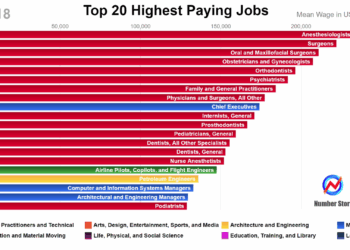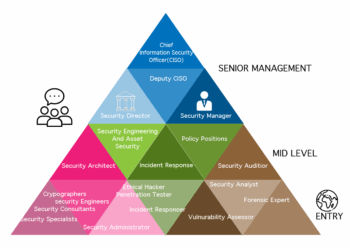Delving into the fastest growing jobs in the AI and machine learning industry, this introduction immerses readers in a unique and compelling narrative. The AI and machine learning sector is experiencing remarkable growth, creating a high demand for professionals skilled in these cutting-edge technologies.
This overview will shed light on the key factors fueling this surge in job opportunities.
Overview of AI and Machine Learning Industry Jobs
AI and machine learning are revolutionizing various industries by enabling computers to learn and adapt through data without being explicitly programmed. This technology has opened up a wide range of opportunities for professionals in the field.The job growth in the AI and machine learning industry is significant, with an increasing demand for skilled professionals who can develop, implement, and maintain these advanced systems.
Companies across sectors are investing heavily in AI technologies to improve efficiency, enhance decision-making processes, and gain a competitive edge in the market.
Factors Driving Demand for AI and Machine Learning Professionals
The demand for AI and machine learning professionals is being driven by several key factors:
- Rapid Technological Advancements: The rapid advancements in AI and machine learning technologies are creating new opportunities and applications across industries, leading to a growing need for skilled professionals.
- Big Data: The exponential growth of data generated by businesses and individuals requires sophisticated algorithms and models to extract valuable insights, increasing the demand for professionals with expertise in AI and machine learning.
- Automation: Automation of tasks and processes through AI and machine learning solutions is becoming essential for businesses to streamline operations and enhance productivity, driving the demand for professionals who can design and implement these systems.
- Competitive Advantage: Companies are leveraging AI and machine learning to gain a competitive advantage by improving customer experiences, optimizing resource allocation, and predicting market trends, fueling the demand for professionals with AI expertise.
In-Demand Job Titles and Roles
As the AI and machine learning industry continues to grow rapidly, the demand for professionals with specialized skills in this field is also on the rise. Here are some of the fastest-growing job titles in AI and machine learning:
Machine Learning Engineer
Machine Learning Engineers are responsible for designing and implementing machine learning algorithms to solve complex problems. They need to have a strong background in computer science, mathematics, and programming languages like Python. Key skills required for this role include data modeling, statistical analysis, and proficiency in machine learning frameworks.
Data Scientist
Data Scientists analyze and interpret complex data to help companies make strategic decisions. They are experts in statistics, data mining, and machine learning techniques. Data Scientists also need strong programming skills and the ability to communicate their findings effectively to non-technical stakeholders.
AI Research Scientist
AI Research Scientists work on cutting-edge research projects to advance the field of artificial intelligence. They develop new algorithms, models, and technologies to push the boundaries of what AI can achieve. This role requires a deep understanding of machine learning, neural networks, and natural language processing.
AI Product Manager
AI Product Managers oversee the development and implementation of AI-powered products and services. They collaborate with cross-functional teams to define product requirements, prioritize features, and drive product strategy. AI Product Managers need a blend of technical expertise, business acumen, and project management skills.
AI Ethicist
AI Ethicists focus on the ethical implications of AI technologies and ensure that AI systems are developed and deployed responsibly. They address issues related to bias, fairness, transparency, and accountability in AI applications. AI Ethicists need a strong background in ethics, philosophy, and a deep understanding of AI principles.
Emerging Trends in AI and Machine Learning Jobs
As the field of AI and machine learning continues to rapidly evolve, several emerging trends are shaping the job market and influencing job requirements. Advancements in technology are driving these changes and creating new opportunities for professionals in this sector.
Specialization in Deep Learning
One of the emerging trends in AI and machine learning jobs is the increasing demand for professionals with expertise in deep learning. Deep learning algorithms are becoming more prevalent in various applications, such as computer vision, natural language processing, and autonomous systems.
Professionals specializing in deep learning are in high demand as companies seek to leverage the capabilities of this advanced technology.
Interdisciplinary Roles
Another trend is the rise of interdisciplinary roles that require a combination of skills in AI, machine learning, and other fields such as biology, psychology, or economics. These hybrid roles are essential for developing innovative solutions that address complex challenges across different industries.
Professionals with diverse skill sets are highly sought after in the job market.
Ethical AI and Responsible Innovation
With the increasing adoption of AI and machine learning technologies, there is a growing emphasis on ethical considerations and responsible innovation. Companies are looking for professionals who can ensure that AI systems are developed and deployed in a way that is fair, transparent, and accountable.
The demand for experts in ethical AI is on the rise as organizations prioritize ethical practices in their AI initiatives.
Educational and Skill Requirements
To excel in the AI and machine learning industry, individuals typically need a solid educational background and a specific set of skills. Employers seek candidates with a strong foundation in computer science, mathematics, and statistics.
Educational Qualifications
- A Bachelor's degree in Computer Science, Engineering, Mathematics, or a related field is often the minimum requirement for entry-level AI and machine learning positions.
- Advanced roles or research positions may require a Master's or Ph.D. in Artificial Intelligence, Machine Learning, Data Science, or a similar discipline.
Essential Skills and Certifications
- Proficiency in programming languages such as Python, R, Java, or C++ is crucial for working with AI and machine learning algorithms.
- Strong mathematical skills, including knowledge of linear algebra, calculus, probability, and statistics, are essential for understanding and developing complex models.
- Experience with machine learning frameworks like TensorFlow, PyTorch, or scikit-learn is highly valued by employers.
- Certifications in AI and machine learning, such as those offered by Google, Microsoft, or IBM, can demonstrate a candidate's expertise and commitment to the field.
Continuous Learning and Upskilling
Continuous learning is paramount in the rapidly evolving field of AI and machine learning. Professionals must stay updated on the latest trends, technologies, and techniques to remain competitive in the job market. Upskilling through online courses, workshops, and conferences can help individuals enhance their expertise and adapt to industry changes effectively.
Salary Trends and Compensation Packages
In the AI and machine learning industry, professionals are often rewarded with competitive salary packages due to the high demand for their specialized skills. Let's take a closer look at the salary trends and compensation packages in this rapidly growing field.
Average Salaries of Different Job Roles
When it comes to salaries in AI and machine learning, job roles can vary significantly based on experience, expertise, and the specific responsibilities of the position. Here is an overview of the average salaries for different job roles within the industry:
- Data Scientist: Data scientists are among the highest-paid professionals in the AI and machine learning field, with average salaries ranging from $90,000 to $160,000 per year.
- Machine Learning Engineer: Machine learning engineers also command high salaries, typically earning between $100,000 and $150,000 annually.
- AI Research Scientist: AI research scientists, who are involved in cutting-edge research and development, can earn salaries ranging from $120,000 to $200,000 per year.
- AI Product Manager: AI product managers play a crucial role in overseeing the development and implementation of AI projects, with salaries averaging between $110,000 and $170,000 annually.
Factors Impacting Salary Levels
Several factors can influence salary levels and compensation packages in the AI and machine learning industry. These include:
- Experience: Professionals with more experience in the field tend to command higher salaries due to their expertise and track record of success.
- Education: Advanced degrees in computer science, data science, or related fields can lead to higher-paying job opportunities in AI and machine learning.
- Industry Demand: The demand for AI and machine learning skills in specific industries or sectors can impact salary levels, with some sectors offering higher compensation packages than others.
- Location: Salaries can vary based on the cost of living in different geographic regions, with tech hubs like Silicon Valley often offering higher salaries to attract top talent.
Work Environment and Company Profiles
AI and machine learning professionals typically work in dynamic and innovative environments that foster creativity and collaboration. These professionals often find themselves at the forefront of cutting-edge technology, working on exciting projects that push the boundaries of what is possible.
Types of Companies and Industries
AI and machine learning professionals are in high demand across various industries, including:
- Technology companies
- Financial institutions
- Healthcare organizations
- Retail companies
- Automotive industry
Leading Companies in AI and Machine Learning
Some of the leading companies known for their AI and machine learning initiatives include:
- Google: Known for its development of AI-powered products such as Google Assistant and Google Photos.
- Amazon: Utilizes machine learning algorithms for its recommendation systems and Alexa voice assistant.
- IBM: Offers AI solutions through its Watson platform, used in various industries for data analysis and decision-making.
- Microsoft: Develops AI technologies like Azure Machine Learning and Cognitive Services for businesses and developers.
- Facebook: Uses AI for content moderation, personalized recommendations, and facial recognition technology.
Epilogue
In conclusion, the discussion on the fastest growing jobs in the AI and machine learning industry highlights the dynamic nature of this field and the promising career prospects it offers. As technology continues to advance, professionals in AI and machine learning will play a crucial role in shaping the future of various industries.
Frequently Asked Questions
What are some of the fastest-growing job titles in AI and machine learning?
Some of the fastest-growing job titles include AI Engineer, Machine Learning Engineer, Data Scientist, and AI Research Scientist.
What educational qualifications are typically needed for AI and machine learning jobs?
Most roles require a bachelor's degree in computer science, data science, mathematics, or a related field. Advanced positions may require a master's or PhD.
How do advancements in technology influence job requirements in AI and machine learning?
As technology evolves, professionals need to stay updated with the latest tools and techniques to remain competitive in the AI and machine learning industry.
What factors impact salary levels and compensation packages in the AI and machine learning field?
Experience, level of expertise, location, and the specific industry or company can all influence salary levels and compensation packages for professionals in AI and machine learning.






